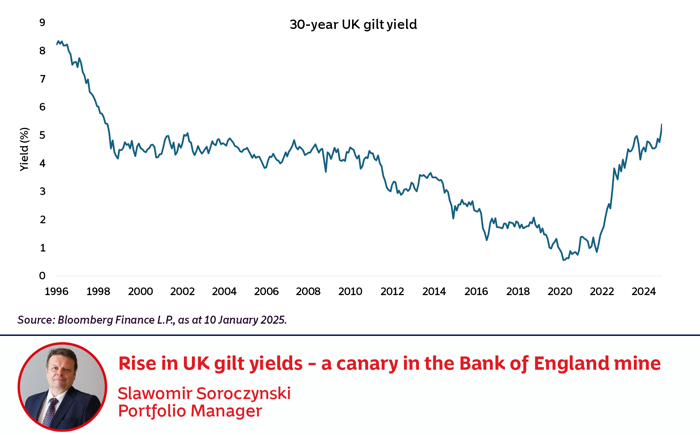
What this chart shows
This chart shows UK 30-year government bonds hitting yields not seen since the last century. The start of the New Year has not been a particularly favourable one for the fixed income market. The upward pressure on yields observed in the final weeks of 2024 has continued into 2025. While this trend is common across government bond markets in developed economies, the UK Gilt market has been especially hard hit. A combination of relatively high inflation, sluggish economic growth, and diminishing support for the new government has rekindled memories of the 'Liz Truss' crisis. As a result, investor appetite for UK long-term debt has been weak.
Why this is important
The longer end of the government bond curve is driven by a variety of factors, including inflation expectations, fiscal policy, and the relative value of UK bonds compared to other developed markets. So far, inflation expectations in the market have remained stable. Many point to uncertainty in the US as the main catalyst for bringing fiscal issues to the forefront. However, the fiscal concerns are not new. In 2024, investors saw French government bond yields widen against German bonds to multi-year highs.
So why is the UK making headlines, with long-term bond yields rising to multi-decade highs? The answer lies in the starting point. Yields have been climbing in recent weeks, particularly after markets largely ignored central bank decisions in December to cut interest rate. However, in the Eurozone or even the US, the starting point for yield increases was lower than in the UK, where investors—still mindful of the 2022 'Liz Truss' crisis—have been more cautious.
If rates keep rising, it likely signals instability across many asset classes, potentially leading to increased price volatility. Government bond yields serve as a risk-free element in multi-asset models, and their rise could have widespread consequences. The Bank of England could opt for the 'nuclear option' and introduce yield control measures, but this may come at the cost of currency depreciation, which, in the case of the UK, could exacerbate inflationary pressures.
Global financial markets were rocked by a significant bond market selloff, with rising yields across major economies (US, EU, UK, Japan, and others), fuelled by inflation fears, concerns over US trade policies under the incoming Trump administration, and shifting investor sentiment. This trend highlighted growing caution among investors, affecting equity markets, currencies, and future economic projections globally.

-
The Dow Jones Industrial Average experienced its worst start to a year since 2016, dropping nearly 700 points on January 10, driven by stronger-than-expected employment growth dampening hopes for Federal Reserve rate cuts.
-
US Treasury yields rose sharply, with the 10-year yield exceeding 4.7%, the highest since April, amid concerns over President-elect Donald Trump's potential trade policies and their inflationary impact.
-
Corporate borrowers issued a record $83 billion in dollar bonds, capitalising on strong investor demand ahead of potential market volatility from the incoming administration.
-
President Joe Biden banned new offshore oil and gas drilling in most US coastal waters, signalling a significant policy shift in the energy sector.

-
Government bonds (gilts) experienced a significant selloff, with yields reaching levels not seen since 1998, raising borrowing costs and concerns about economic growth.
-
The British pound fell to a 14-month low against the US dollar, influenced by rising gilt yields and economic uncertainties, that could be ripe for US acquisitions.
-
The Bank of England’s Sarah Breeden brushed off this week’s gilt moves, saying she backs further rate cuts. Even so, some economists say the BoE will need to slow the pace of easing.
-
Confidence among British businesses plummeted to the lowest levels since September 2022, with concerns over taxation and sales prospects.

-
German Bund yields rose significantly, reflecting a broader global bond market selloff amid concerns over US trade policies and rising inflation.
-
The re-election of Donald Trump raises prospects of global tax disputes, with his administration's intent to penalise countries imposing extra levies on US multinationals, potentially affecting the EU.
-
US President-elect Donald Trump has shown renewed interest in taking control of Greenland, a territory of Denmark in the Arctic, as well as expanding into Canada and Panama Canal.
-
European companies are warned of increased activism, with 86% expecting a rise in 2025, particularly targeting mid-sized firms with market values of €1bn to €2bn.

-
China's latest inflation at 0.1% raises concerns about deflation, with similarities being drawn to Japan's economic situation 30 years ago.
-
Chinese equities fell over 5% in early 2025, influenced by deflation concerns and an ailing property sector.
-
Japan faces ongoing economic challenges, with concerns about deflationary pressures and the impact of global trade dynamics on its export-driven economy.
-
Oil prices rose to levels last seen in October, driven by geopolitical concerns and US sanctions on Russian oil producers.
